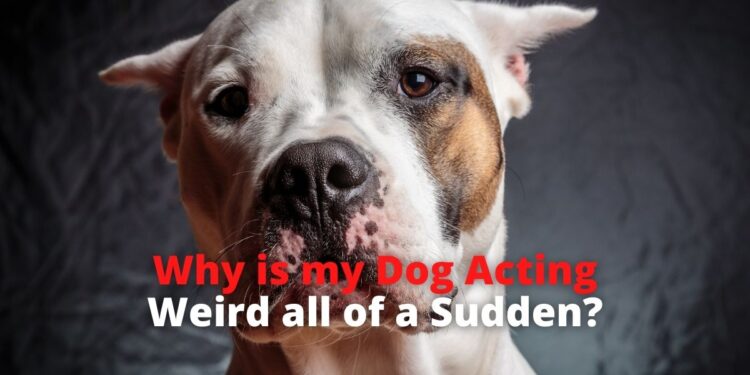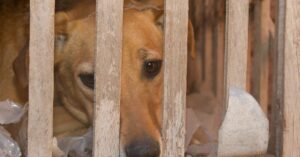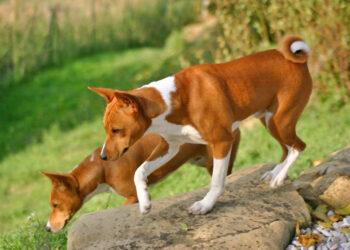Has your furbaby been acting all strange and weird??? Well, you are not alone.
Almost 80 percent of pet parents go through this stage at least once in their lifetime. And while this may seem pretty much devastating, fortunately it is reversible with the right methods. But why do they go through such sudden behavior changes????
Well your dog may be acting weird all of a sudden if it is fearful, ill, has separation anxiety, is injured, excessive boredom, diet problems, and many such reasons.
To know more, keep on reading until the very end.
Table of Contents
Why do dogs act weird?
Dogs are living beings and are very much capable of experiencing pleasure, fear, sadness, pain, and every other basic emotion. So, when your canine starts exhibiting weird behaviors or does something very bizarre, there might be something that may be troubling the little pooch.
This could be due to a sudden environmental change, some physical ailment that’s troubling them or even due to a psychological trauma. Such dogs would often isolate themselves, lose their appetite or show sudden aggression towards their family members.
What are the signs of a dog acting weirdly?
Even though all dogs have differing personas and therefore behave in their own special ways, here are a few common signs that could show that they are acting weirdly.
- Hacking and coughing continuously
- Whimpering with tails tucked and ears down
- Excessive chewing and other destructive behaviors
- Dragging their rear across the floor
- Accidents all over the home
- Hiding or running away
- Acting very clingy
- Drastic change in their appetite
- Drinking water excessively
- Constant nose-licking or head shaking
- Biting, scratching, or licking body parts
- Severe lethargy
- Mood swings
- Sudden aggression or unpredictable snapping
- Avoiding touch, even from their owners
- Yelping or screaming
- Shivering, shaking or trembling, etc.
Remember these are only a few of the most frequently reported behaviors. A canine may also exhibit a completely different behavior that they don’t do often or have been trained to never do.
Now that we have an idea on what makes them do these crazy things, here’s why with the top 13 reasons.
13 Reasons why your Dog is acting weird suddenly
Fear
One of the top reasons that comes into mind when looking for the source of the sudden change is that something or someone might have triggered the action. It could happen due to sudden loud noises, unpleasant smells, and even objects or people. The dog will hide, run away, pee at places, whimper when touched or may even snap aggressively.
In these cases, it is better to keep the pup away from the source of its fear for the time being. Later on pet parents should consult with a vet and work with canine behavioral experts so as to relieve the fear and stress.
Illness
The second most common reason is a rather broad category and could vary from one pup to another. For instance, all pups with parasitic infections don’t actually exhibit weird symptoms and may continue on living as if nothing has happened. However, at the same time, some may behave very strangely, with their behaviors ranging from subtle changes to a complete 360 degree change.
So, if recently your pup has been showing great changes in its appetite or are dragging their rears on the floor, it is best to have them checked by a professional. This early diagnosis may also save your pup from a whole deal of pain and discomfort in case there is something very bad going on inside them.
Injury
If there’s an injury that keeps your dog from sitting or sleeping peacefully, then also they might start doing weird things. Based upon the location and severity of the wound, their behavior will mostly change. In case they have hurt their paw, they will keep licking their paw. Similarly, if their leg is wounded, they will automatically refrain from going on walks, zooming around the house, or even sleep in their favorite position.
These pups may also scratch, bite at the site which could lead to secondary infections. Therefore, as a responsible pet parent you will be needed to take care of the wound personally at home or get it checked and wrapped by the vet. A few painkillers and topical ointments may also be used if the situation calls for so, but they should be prescribed.
Environmental change
Shifting to a new place is troublesome for both humans as well as the furry companions. The pup has to adjust with the new surroundings, meet new faces, and even change their preferences according to their new routine, which can be overwhelming for some pooches. This could make them anxious, thereby leading to weird occurrences and change in behaviors.
Therefore, to help your pooch adjust to their new routine or environment, it is better to start with a reliable daily routine. Try and implement the same previous feeding, walking, and potty timings for some time before going with the new one.
Dietary changes
Dogs love to nibble anything and everything. But that doesn’t make all of these canines good with dietary changes. For instance, if you are experimenting with your dog’s food too quickly, they may not like the change. The sudden change in taste and smell of what they normally eat could upset them. And eventually the pup starts to lose its appetite and may not seem as enthusiastic as before during feeding time.
This is also possible when you are feeding the pooch the same bland diet everyday without inducing any changes. Thus the bottom line is when making dietary changes always start slow and gradual.
Insufficient nutrition
Our beloved doggies need a lot of daily calories for their tiny bodies. Their food needs to be rich in all essential nutrients, vitamins, and minerals for that, without which they could end up with lack of energy. Such a dog would often stay depressed, lack energy, pant excessively with just a few zoomies, and may even not wake up from their bed.
A lack of energy is very bad for the pooch’s body and should be handled very carefully. Feeding them with dog food only is never the wise thing to do. Pet parents can always add in a few vet recommended homemade items to their dish and see the magic.
Stress
Excessive levels of stress is never good for anyone, be it humans or canines. It could happen due to ‘x, y, z’ reasons, and could be gradual or sudden. So, if lately your pooch has been shaking and shivering their head too much, or keeping their ears down, and avoiding your touch, this might mean they are suffering from heightened stress levels.
A stressed out pup may whine and hide or turn very aggressive even towards its own family. Therefore, it is always better to mark their actions carefully to find out the triggering factor and then work for the solution. But if the problem is rather complicated, and doesn’t involve any physical factors, a vet consultation is a must.
Anxiety attacks
A similar form of psychological issue, woofers suffering from heightened anxiety are very prone to severe panic attacks. To back this up, a recent study even proved that this number goes as high as 72.5 percent of anxiety-stricken pups. Therefore, even though such pups may seem normal, a sudden change or even their owner’s absence could cause them to have a very bad anxiety attack.
These anxiety attacks can be mild, or too severe, including excessive barking, howling, destroying furniture, chewing anything and everything and even peeing and pooping in the house. Dog anxiety is of different types, with the most common ones including age-related anxiety, separation anxiety, fear-related anxiety, etc. And the only solution out of this is ‘Positive Reinforcement Training’ methods.
Allergies & External Parasites
Has your pooch recently been scratching, pawing, or have been biting their skin really hard??? Then, this may be a cause of food and skin allergies or even due to infestations of ticks, fleas, dog lice, and other external parasites. These conditions although might not seem like much, they could easily leave your fur baby very much uncomfortable and feeling all itchy.
These allergies can range from mild to severe and usually require certain medications to finally stop. Canine allergies are one of the most common forms of illnesses that any pup can be exposed to, therefore pet parents are always required to have allergy-specific medications handy with them. However, for dermatitis resulting due to ticks, fleas, mites, or dog lice, advanced professional care might be needed for a long time.
Boredom
Mostly seen in homes with one dog and with pet parents staying most of their time outside, the canine may resort to destructive behaviors suddenly. It typically happens when the pup grows bored out of its wits or is poorly exercised with not enough focus on its pent-up energy. As a result, the completely behaved dog may start protesting in its own way by chewing up things, destroying furniture, and even barking or whining excessively.
The only solution here will be to understand your pup’s exercise requirements and ensure they are properly stimulated everyday. A high energy dog should be taken on long walks, with plenty of physical and mentally stimulating games, and a good game of tug-of-war. This will make the pooch both happy and tired enough to have him sleep for the majority of time you aren’t there.
New faces
Even though dogs are known to be very curious with new faces and pets, not every puppy gets as excited or happy as you may think. Meeting new people, or animals can make their senses go into full overwhelmed mode which could bring on increased production of stress hormones, and therefore leave them all anxious. So, when meeting strangers some puppies may hide behind you, turn aggressive or even bark excessively at them.
To make it easy for all, you should watch your canine’s body behavior and have them slowly introduced for best results. Starting with letting them sniff the person or animal’s belongings and then gradually introducing is a good idea. Similarly, never let anyone that your pet has never been introduced to previously touch or grope them. Believe me, this could result in severe consequences and someone could be in for a vicious bite.
Mistreatment
All dogs love their owners. However, if they are mistreated, shouted or hit at, then they might not be too comfortable around you. The same also applies if your dog is an adult rescue or has been adopted from a shelter. Such canines often have an abusive history and exhibit typical weird behaviors including tucking their tails, whimpering, doing accidents in the house, or even snapping at times.
This will require the owners to be very patient with their pooches until they have gained back the confidence and trust. But if you are the one that has been using force and the very wrong methods to control or supposedly ‘calm them’, then you are the one who needs to amend your methods and try again. There is nothing as priceless as a canine’s love and therefore this relationship needs to be preserved till the very last.
Extreme changes in weather
All kinds of nature-related changes have a much more severe effect on canines and other animals as compared to humans. This is mostly because of their heightened senses which makes them extremely susceptible to these variations, and hence act weirdly. For instance, you might have seen your pup get severe lethargic and depressed when it’s raining cats and dogs outside, or they may get super excited when fall is continuing.
However, such changes don’t happen with every dog. So, while most of the pups will happily spend their days all cuddled up with their humans, others might have a hard time even getting out of the bed. If your dog also acts weird when there’s a sudden change in the weather condition, getting him/her medically checked up may come handy. The vet would be able to point out if this is a normal reaction or due to some underlying disease, and hence treat it better.
It can be scary and intimidating for owners to watch their perfectly mild-tempered four-legged ‘gentleman/lady’ behave out of the blue. But, rather than being super conscious about it, it is better to get into work. Since we humans can’t understand what our furry partners speak, we have to look for clues through their body actions and typical behaviors.
Later this information can be used to point out the stressful factors and eradicate it efficiently through the right methods. Sometimes it may also help find any serious underlying health disease that may be secretly causing out such bizarre behaviors from your pup and treat them before it worsens further.
Subscribe to spanieldogs.com and enjoy all our regular recent releases on all kinds of interesting things on dogs and their proper care.
If you are a dog lover then, Subscribe to our weekly newsletters. No Spams!











